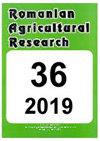Investigating Iron Oxide Nanoparticles and Piriformospora indica Roles in Mitigating the Harmful Effects of Drought Stress in Soybean: Antioxidant Enzymes and Oil Content
IF 1
4区 农林科学
Q3 AGRONOMY
引用次数: 0
Abstract
Drought stress is one of the most important environmental stresses that affects the quantity and quality of soybean production. This study was conducted to explore the role of iron oxide nanoparticles (NPs) application and Piriformospora indica inoculation in alleviating the adversities of drought stress on fatty acid composition and oil production in soybean. The results showed that seed oil synthesis was considerably reduced by drought stress, whereas the membrane lipid peroxidation was accelerated under drought stress condition. The applied NPs (especially 0.75g L-1 ) and P. indica enhanced the activities of enzymatic antioxidants (SOD, CAT, PPO and APX) with simultaneous decrease in malondialdehyde. Under drought stress, an inverse relationship between protein and seed oil was observed, as by increasing protein content, seed oil decreased linearly. In addition, the main oil constituents, oleic and stearic acids increased, while linoleic, linolenic and palmitic acids reached to the lowest level in severe drought stress (FC 20%). Interestingly, the beneficial effects of NPs and P. indica led to improvement in grain weight, fatty acid composition and oil content under drought stress. During drought stress, oleic, linoleic, linolenic and palmitic acids increased and stearic acid decreased considerably in P. indica and NPs treatments. However, combined NPs and P. indica was generally more effective in alleviation of drought stress deleterious effects than individual treatments.氧化铁纳米颗粒和梨状孢子虫对大豆抗旱性影响的研究:抗氧化酶和油脂含量
干旱胁迫是影响大豆产量和品质的重要环境胁迫之一。本试验旨在探讨施用氧化铁纳米颗粒(NPs)和接种梨状孢子虫(Piriformospora indica)对缓解干旱胁迫对大豆脂肪酸组成和油脂产量的影响。结果表明,干旱胁迫显著降低了种子油脂的合成,加速了膜脂过氧化。施用NPs(特别是0.75g L-1)和籼稻提高了酶促抗氧化剂(SOD、CAT、PPO和APX)的活性,同时降低了丙二醛。在干旱胁迫下,蛋白质含量与种子油含量呈反比关系,随着蛋白质含量的增加,种子油含量呈线性下降。此外,主要油类成分油酸和硬脂酸含量增加,而亚油酸、亚麻酸和棕榈酸在严重干旱胁迫下达到最低水平(FC 20%)。NPs和籼稻在干旱胁迫下籽粒重、脂肪酸组成和含油量均有显著提高。干旱胁迫下,籼稻和NPs处理的油酸、亚油酸、亚麻酸和棕榈酸显著增加,硬脂酸显著降低。然而,NPs和籼稻联合施用通常比单独处理更有效地缓解干旱胁迫的有害影响。
本文章由计算机程序翻译,如有差异,请以英文原文为准。
求助全文
约1分钟内获得全文
求助全文
来源期刊

Romanian Agricultural Research
农林科学-农艺学
CiteScore
0.90
自引率
28.60%
发文量
2
审稿时长
>12 weeks
期刊介绍:
The Journal ROMANIAN AGRICULTURAL RESEARCH is an “open access” one, which publishes original articles, short communications, presenting new scientific results – theoretical, experimental and technical – on plant breeding and genetics, physiology, biotechnology, mineral nutrition and plant protection, in field crops. Reviews on up-to date subjects and recent research, preferably from Eastern Europe, may also be published.
 求助内容:
求助内容: 应助结果提醒方式:
应助结果提醒方式:


